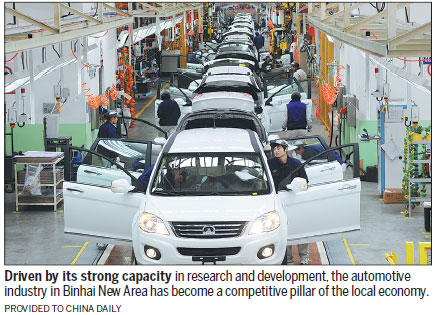
Raft of preferential policies boosting innovation paying dividends
The total profit of industrial companies in the Tianjin Binhai New Area saw year-on-year growth of 30 percent in 2017, benefiting from supporting policies designed to boost the innovation and upgrading of the local manufacturing industry.
Officials said last year the total output value of Binhai's manufacturing industry reached 773 billion yuan ($118.78 billion). The output value of the innovation-driven advanced manufacturing sector reached 259.7 billion yuan, accounting for 29.6 percent of the area's total industrial output value.
The proportion of research and development investment in GDP reached 2.7 percent, and the number of invention patents obtained by local people and institutions hit 7,849, according to official statistics.
A total of 146 of the world's top 500 corporations have invested in more than 400 companies in Binhai.
High-tech companies, considered as pillars of innovation in the area, also experienced remarkable development.
By the end of 2017, there were a total of 30,096 high-tech groups operating in the area. Among these were 1,527 whose revenues exceeded 100 million yuan. The number of nationally accredited high-tech enterprises reached 1,944.
At present, the area has 464 R&D centers at or above the municipal level, including 111 key laboratories - 16 at the national level. In addition there are 112 engineering centers, 17 at the national level, and 241 corporate technology centers with 30 at the national level.
Officials say 33 industrial alliances for technological innovation have been formed.
In 2017, 10 public spaces were allocated to entrepreneurs for potential business startups in the area, taking the total number of spaces to 58.
To date, these public spaces in Binhai have attracted 5,211 entrepreneurs and 2, 440 startup enterprises. The spaces have helped entrepreneurs obtain financing support amounting to 3.56 billion yuan.
A total of 15 national-level incubators were established in the area, almost half the total in the city of Tianjin.
Consequently, steady progress has been made in a number of major technological projects, including the Tianhe-3 supercomputer, the Kylin server operating system, internet of things projects and radio frequency identification.
Local companies have also reportedly developed the world's first long-distance integrated iris face recognition system and the first smart phone equipped with an iris recognition and authentication function.
The FT-2000 (64 core) chip, which is the world's first chip working under the framework of the Acorn RISC Machine - an architecture for computer processors - has been developed in the area and widely applied in the market.
The construction of innovation platforms in Binhai has been paving the way for the industrial upgrade in the manufacturing industry.
In the future, the area will roll out more incentive policies to support the integrated development of Beijing, Tianjin and Hebei province, to introduce more professionals and cultivate more emerging technologies focusing on artificial intelligence, 5G communications and the IoT, according to local officials.


